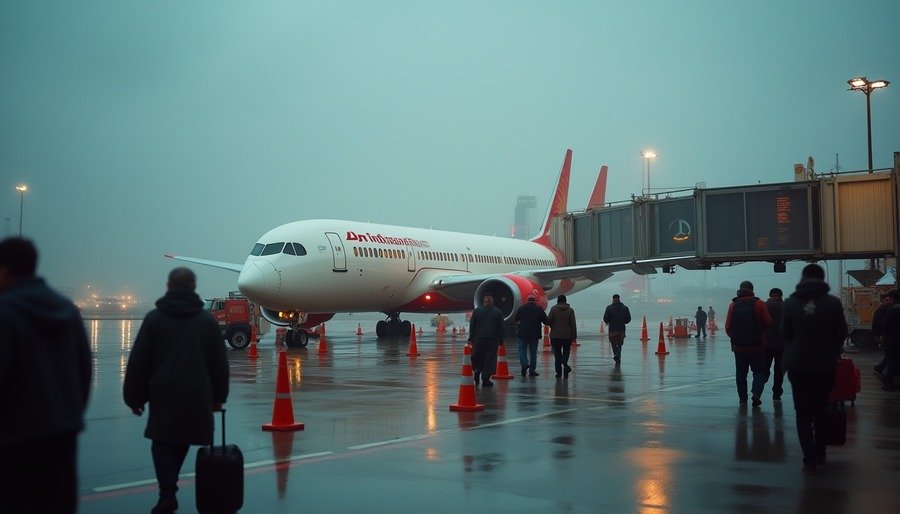Sunday, June 22, 2025

An Air India flight traveling from Birmingham, UK, to Delhi, India was abruptly diverted to Riyadh, Saudi Arabia, following a serious bomb threat, prompting an immediate security response and extensive passenger distress. The incident underscores the persistent security challenges and operational vulnerabilities faced by airlines and airports worldwide.
Critical Bomb Threat Forces Mid-Air Diversion
The diverted flight was operating normally when airline officials received credible intelligence regarding a potential bomb threat onboard. Prioritizing passenger and crew safety, the pilots swiftly executed emergency protocols, rerouting the flight to Riyadh’s King Khalid International Airport for immediate security intervention.
Upon landing, Saudi Arabian authorities implemented rigorous security checks, evacuating passengers safely and conducting comprehensive searches of the aircraft. These precautionary measures, though essential, resulted in significant disruption and uncertainty for passengers.
Passengers Experience Severe Anxiety and Disruption
The emergency diversion left passengers understandably anxious and confused. Many expressed frustration over the limited initial communication from the airline regarding the severity of the threat and expected timelines for resuming their journey. The prolonged delay and uncertainty exacerbated their stress, reflecting broader issues of passenger care during aviation emergencies.
This incident highlights the crucial importance of transparent, timely, and effective communication from airlines during emergencies. Clear and consistent updates can significantly mitigate passenger anxiety and ensure better crisis management.
Security Protocols Activated: Collaborative International Efforts
The immediate diversion and subsequent security measures at Riyadh airport underscore effective international collaboration in aviation safety. Saudi authorities acted swiftly, coordinating closely with Air India and global aviation security bodies to manage the situation efficiently.
Such cross-border cooperation demonstrates the robust safety protocols in place globally to handle aviation security threats, reassuring travelers of rigorous safety measures protecting air travel. However, the incident also points to persistent threats that require continuous vigilance and preparedness.
Operational Implications for Air India
This event poses significant operational and reputational challenges for Air India. Emergency diversions due to security threats not only incur substantial financial costs but also impact passenger confidence and the airline’s global image.
Moving forward, Air India must reassess its crisis communication strategies and passenger care protocols during emergency situations. Strengthening internal crisis management capabilities and prioritizing transparent passenger communication can significantly improve public perception and trust.
Broader Aviation Industry Concerns
The bomb threat incident highlights persistent global concerns regarding aviation security and underscores the necessity for ongoing improvements in threat detection, passenger screening, and emergency response protocols. Airlines worldwide must remain vigilant and proactive in addressing these security challenges.
Enhanced training for airline personnel, comprehensive risk assessment procedures, and collaborative international security frameworks are critical for effectively managing similar threats in the future. Ensuring passenger safety remains paramount, requiring constant innovation and vigilance within the aviation industry.
Advice for Passengers: Staying Informed and Prepared
Passengers traveling internationally should maintain awareness of airline security procedures and potential risks. Staying informed through official airline communication channels, particularly during crises, can significantly alleviate stress and confusion.
Travelers are encouraged to familiarize themselves with emergency protocols and ensure access to timely flight updates. Considering comprehensive travel insurance can also provide additional security and financial protection in unforeseen circumstances.
Future Preparedness: Enhancing Aviation Security and Passenger Confidence
The Air India bomb threat incident emphasizes the importance of continuous improvements in aviation security and crisis management. Airlines must prioritize comprehensive crisis preparedness, clear passenger communication, and robust security protocols to effectively manage emergencies and maintain passenger trust.
Industry-wide collaboration, regular security drills, and transparent communication practices will be critical in strengthening global aviation safety. Learning from such incidents helps build resilient systems capable of swiftly responding to threats and protecting passenger welfare.
Aviation Safety and Communication at Its Best
Air India’s Birmingham-Delhi Flight Diversion Due to Bomb Threat is a harsh reality check for the sustaining struggles of aircraft security. Appropriate procedures for responding, transparent communication, and effective global collaboration are essential elements for ensuring that people are safe and distress is minimized.
It requires collaboration between airlines, authorities, and passengers for enhancing security measures, handling emergencies, and communication procedures. Passenger protection and safety are always at the forefront with the potential for future international air transport

